
First, some facts. Of the Legal Studies graduates from St. John's University we've analyzed , here's how many have used (or NOT used) their degree in their career:

These are estimates based on AI analysis of 16 LinkedIn profiles (see below).
The verdict? Slightly below average. Overall, with an average relevance score of 63%, Legal Studies graduates from St. John's University have a slightly lower likelihood (-4%) of finding work in this field compared to the average graduate across all fields:
And for comparison, here's the chart for all profiles we've looked at across all degrees.
Also, after graduating, 43% of these graduates have pursued further education other than another Bachelor's degree (such as a Masters degree or other), compared to the average across all profiles of 35%. This suggests you may need more than just a Bachelors degree to be competitive as a Legal Studies graduate.
See the details:
|
Relevance score: 100% We think this person has gone into a career highly relevant to their degree. We think this person has gone into a career highly relevant to their degree.
DEGREE INFOGraduated in 2013 from St. John's University with a Bachelor of Science (B.S.) in Legal Studies. No other secondary education since. JOB HISTORY SINCE GRADUATIONIntake Paralegal Lemberg Law Oct 2013 - Present ABOUTNo information provided. |
The top 10 most common jobs done by the graduates we've analyzed (ranked most common to least) are:
When looking at the types of jobs people from St. John's University with a degree in Legal Studies have taken up, it’s interesting to see a mix of roles. A significant number of graduates have gone into positions directly related to law, like paralegals, legal interns, and attorneys, where they apply their knowledge and skills on the job regularly. These roles are obviously relevant to their studies since they deal with legal principles and practices day in and day out. However, there are also many who veered away from the legal field entirely, landing in roles like regional management, teaching, and even software engineering, which don't really use any legal knowledge at all. It shows that while a Legal Studies degree provides useful skills, like critical thinking and communication, many graduates end up in unrelated fields.
Overall, the trend among these graduates indicates a split between those who pursue careers in law and those who find themselves in various other sectors. While occupations like managing attorney or paralegal show a strong connection to their degree, many have taken paths that don't directly utilize their legal education. So, if you’re considering a degree in Legal Studies, it's super important to think about how you want to apply that education—whether you aim to stick to the legal field or explore other career opportunities that may or may not relate to what you've learned.
Here is a visual representation of the most common words in job titles for Legal Studies graduates (this is across all Legal Studies graduates we've analyzed, not just those who went to St. John's University):

Graduates from St. John's University with a degree in Legal Studies seem to have quite a mixed bag of career paths. In the early stages right after graduation, many of them tend to take roles that are closely related to the legal field, such as paralegals, legal interns, or administrative roles within law offices. For instance, graduates from 2018 and 2021 have already held positions like paralegal and legal intern, which clearly aligns with their studies. However, not everyone sticks to the legal trajectory right after graduation. Some graduates, like those from 2013, ended up in retail jobs and service industries, showing that not all paths lead directly into law-related careers. It’s a bit of a hit or miss situation depending on individual choices and job availability.
Fast forward five to ten years after graduation, and you see some graduates carving out solid legal careers, like becoming managing attorneys or moving into positions like legal secretary or human resources in legal settings. There are also those who have shifted into different sectors entirely, leveraging their skills in teaching, coaching, and event planning, which might not be strictly related to Legal Studies but still showcase their versatility. On the flip side, a few have stayed in customer service roles or transitioned to unrelated jobs, which suggests that while some definitely find fruitful careers, others might find themselves drifting away from the legal field altogether, perhaps due to market conditions or personal interests. Overall, St. John's University graduates have a decent chance of finding relevant work in the field shortly after graduation, but not everyone may continue in that direction long term.
Getting a Bachelor’s degree in Legal Studies, like the one at St. John’s University, can be pretty manageable if you stay organized and are interested in the subject matter. Generally speaking, it’s not the most difficult degree out there; it combines a lot of reading and writing with some practical applications of law. You’ll cover topics like criminal law, contracts, and ethics, which can be really interesting if you’re into that kind of stuff. However, it does require a good amount of critical thinking and analysis, so if you enjoy engaging with complex ideas and discussing them, you’ll probably find it more enjoyable than tough. Overall, if you keep up with the coursework and participate actively, you should be able to handle it just fine!
Most commonly, in the LinkedIn profiles we've looked at, it takes people 4 years to finish a Bachelor degree in Legal Studies.
Looking at these St. John's University graduates, it's clear they’ve taken some different paths in their careers, and the money they've made seems to vary quite a bit. You've got folks like the Managing Attorney and the Software Engineer who likely earn pretty decent salaries, especially given their positions and experience. On the other hand, many others started with more entry-level or teaching roles that don't typically pay all that well. Even some recent graduates are still hanging on to internships or early-career roles, which often come with low pay. So, while some seem to be doing alright financially, others might be just getting by or even struggling a bit as they build their careers. It really shows how much the job market and specific career choices can affect earning potential!
Here is a visual representation of the most common words seen in the "about" section of LinkedIn profiles who have a Bachelor degree in Legal Studies (this is across all Legal Studies graduates we've analyzed, not just those who went to St. John's University). This may or may not be useful:

Here are all colleges offering a Bachelor degree in Legal Studies (ordered by the average relevance score of their Legal Studies graduates, best to worst) where we have analyzed at least 10 of their graduates:
| College | Score | Count |
|---|---|---|
 University of Central Florida University of Central Florida
|
70 | 34 |
 University of California, Berkeley University of California, Berkeley
|
67 | 15 |
 Grand Valley State University Grand Valley State University
|
67 | 10 |
 Florida Gulf Coast University Florida Gulf Coast University
|
67 | 10 |
 St. John's University St. John's University
|
63 | 16 |
 Kaplan University Kaplan University
|
50 | 11 |
 University of California, Santa Cruz University of California, Santa Cruz
|
49 | 10 |